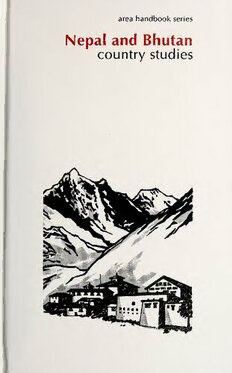
Nepal And Bhutan, Country Studies PDF
Preview Nepal And Bhutan, Country Studies
area handbook series Nepal and Bhutan country studies 7 o Nepal and Bhutan country studies Federal Research Division Library of Congress Edited by Andrea Matles Savada Research Completed September 1991 On the cover: Mountains and monasteries are typical of both Nepal and Bhutan. Third Edition, First Printing, 1993. Library of Congress Cataloging-in-Publication Data Nepal and Bhutan : country studies/ Federal Researc—hDivision, Library of Congress ;—edited by Andrea Matles Savada. 3rd ed. p. cm. (Area handbook series, ISSN 1057-5294) (DA pam 550-35) ; "Supersedes the 1973 edition ofArea handbook for Nepal, — Bhutan, and Sikkim written by George L. Harris, et al." T.p. verso. "Research completed September 1991." Includes bibliographical references (pp. 369-393) and index. ISBN 0-8444-0777-1 1. Nepal. 2. Bhutan. I. Savada, Andrea Matles, 1950- . II. Library of Congress. Federal Research Division. III. Area hand- book for Nepal and Bhutan. IV. Series. V. Series: DA pam ; 550-35. DS491.4.N46 1993 93-12226 954.96—dc20 CIP Headquarters, Department of the Army DA Pam 550-35 ForsalebytheSuperintendentofDocuments, U.S. GovernmentPrintingOffice Washington,D.C 20402 Foreword This volume is one in a continuing series ofbooks prepared by the Federal Research Division ofthe Library of Congress under the Country Studies/Area Handbook Program sponsored by the Departmentofthe Army. The last page ofthis booklists the other published studies. Most books in the series deal with a particular foreign country, describingand analyzing its political, economic, social, and national security systems and institutions, and examining the interrelation- ships of those systems and the ways they are shaped by cultural factors. Each study iswritten by a multidisciplinary team ofsocial scientists. The authors seek to provide a basic understanding of the observed society, striving for a dynamic rather than a static portrayal. Particular attention is devoted to the people who make upthe society, theirorigins, dominantbeliefsandvalues, theircom- mon interests and the issues on which they are divided, the nature andextent oftheirinvolvementwithnational institutions, andtheir attitudes toward each other and toward their social system and political order. The books represent the analysis ofthe authors and should not be construed as an expression ofan official United States govern- ment position, policy, or decision. The authors have sought to adhere to accepted standards ofscholarly objectivity. Corrections, additions, and suggestions for changes from readers will be wel- comed for use in future editions. Louis R. Mortimer Chief Federal Research Division Library of Congress Washington, D.C. 20540 iii Acknowledgments The authors wish to thank the various individuals and organi- zations that provided assistance in the preparation of this book. Allen W. Thrasher, Asian Division, and Lygia M. Ballantyne and the staffofthe New Delhi Field Office ofthe Library ofCongress provided useful and timely research materials from Bhutan. Karl Ryavec of the Defense Mapping Agency verified hard-to-locate Nepalese and Bhutanese place-names and spellings. Staff of the Royal Nepalese Embassy in Washington provided photographs, statistical data, and the clarification of information. Staff of the Permanent Mission to the United Nations ofthe Kingdom ofBhu- tan kindly provided maps, photographs, and documentary infor- mation on Bhutan. Special thanks goes to Brian C. Shaw for lending his expertise on Nepal and Bhutan in serving as reader of the completed manuscript. Additionally, Thierry Mathou, a memberofthe staff ofthe Embassy ofFrance in Washington, who is preparinghis own manuscript on Bhutan, reviewed the Bhutan text and providedhelp- ful research materials and insights. Gopal Siwkoti, then an attor- ney with the Washington-based International Human Rights Law Group, also provided materials and shared his insights on the de- velopmentofNepalese politics duringthe prodemocracymovement. Tshering Dorji, director ofthe Department ofTelecommunications of the Kingdom of Bhutan, graciously allowed the author of the Bhutan chapter to interview him when he visited the Library of Congress and reviewed and suggested corrections to the section on Bhutan's telecommunications. Thanks are also due Ralph K. Benesch, who oversees the Country Studies/Area Handbook Pro- gram for the Department of the Army. Thanks also go to staffmembers ofthe Federal Research Divi- sion ofthe Library ofCongress who directly assisted with the book. SandraW. Meditz reviewed the entire manuscript and made use- ful suggestions; David P. Cabitto prepared the layout and graph- ics; Marilyn Majeska supervised editing and managed production; Andrea Merrill provided invaluable assistance in preparingthe ta- bles; Timothy L. Merrill reviewed the maps and geography and telecommunications sections; Ly Burnham reviewed sections on demography; Alberta King provided secondary-source research J. assistance in the preparation of Chapter 6 and bibliographic as- sistance for other chapters; and Izella Watson and Barbara Edg- erton performed word processing. v The following individuals are gratefully acknowledged as well: Harriett R. Blood forpreparingthe topography and drainage maps; Barbara Harrison and BeverlyJ Wolpert for editing the body of . the book; Catherine Schwartzstein for prepublication editorial review; Joan C. Cook for preparing the index; Joyce L. Rahim for word-processing support; and Malinda B. Neale and Linda Peterson ofthe Printing and Processing Section, Library ofCon- gress, for phototypesetting, under the direction of Peggy Pixley. Finally, the authors acknowledge the generosity oftheindividuals and the public and private agencieswho allowed theirphotographs to be used in this study. vi
